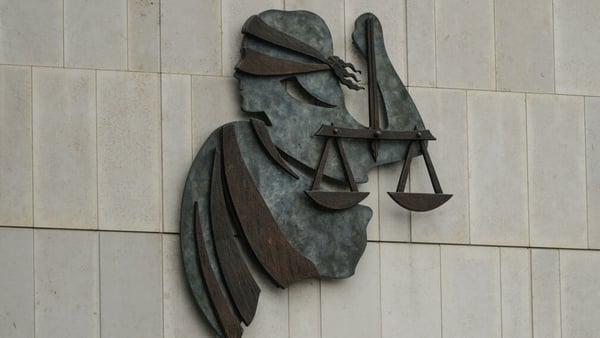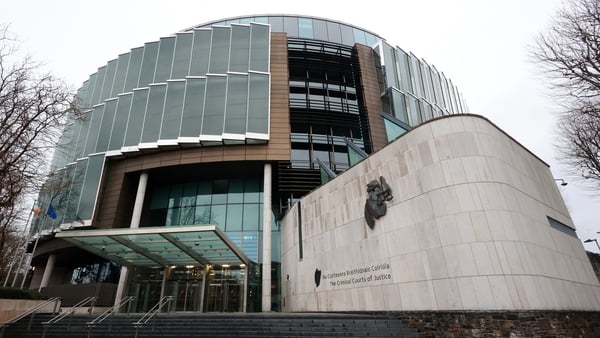A man who harassed six women writers and journalists by sending them hundreds of abusive messages over a number of years has been jailed for three years.
Brendan Doolin, 37, from Leighlin Road, Crumlin, was described as a total recluse who never left his home and became an internet troll.
He has been banned from contacting the women involved for the rest of his life.
The women were targeted by Doolin because they were journalists and writers with a strong social media presence, particularly on Twitter.
They described how they felt at times like they were "under surveillance" as his abusive messages often arrived after they had written an article or appeared on television or radio.
His lawyers said Doolin viewed himself as someone with no voice and completely insignificant so he developed an alternative persona through his use the internet.
He pleaded guilty at Dublin Circuit Criminal Court to harassing Sarah Griffin, Kate McEvoy, Sinead O'Carroll, Christine Bohan, Roe McDermott and Aoife Barry on dates between May 2012 and February 2018.
Judge Martin Nolan said that "undoubtedly the internet has wonderful advantages", but what the court has heard in this case is "the dark side which allows a man sitting in his house to inflict huge amounts of trauma on six women".
Judge Nolan said his behaviour towards the victims was gravely reprehensible because he persisted in communicating with them for so long despite repeated requests to stop.
The judge said the six women rightly feared they were being stalked on the internet and their feelings were reasonable and understandable.
He imposed a five-year sentence, suspending the final two years.
We need your consent to load this rte-player contentWe use rte-player to manage extra content that can set cookies on your device and collect data about your activity. Please review their details and accept them to load the content.Manage Preferences
The women said that Brendan Doolin's "campaign of harassment against us went on for years".
In a statement they said: "We hope this case shows other men and women in this situation that what they say will be taken seriously if they come forward, and that online harassment is harassment and will be treated as such.
"We hope Brendan Doolin receives the help and rehabilitation he needs. We'd like to thank Detective Garda Colm Gallagher and his colleagues at the Cyber Crime Unit for their painstaking work on, and sensitive approach to, this case".
Read:
Sinead O'Carroll's victim impact statement
Aoife Barry's victim impact statement
Editor of the Journal news website Sinead O'Carroll, was once contacted and told to "break both legs" after she tweeted to promote an upcoming appearance on a television programme.
Kate McEvoy was informed that the sender of the emails was in the area where she lived, and once when she tweeted that her housemate had gone out for the evening, he messaged: "Good I'll be over soon."
Christine Bohan, who got more than 450 messages from Doolin, also received a 10-year-old political leaflet from him which carried a photograph of her on it. She was also sent an image of her from a dinner at her old college. After receiving this, Ms Bohan feared he had scoured the internet looking for her image.
Each of the women received hundreds of emails, usually using the same unusual font, containing insults such as calling the women "wannabes, nobodies, whiteist, bigots, lefties and pseudo intellectuals."
He accused them of being narcissistic attention seekers, self-obsessed and concerned with their own self-promotion, referring to their "Twitter bubble" and suggesting that they do not care for others.
Writer and journalist Roe McDermott had replied, telling him that his contact was unwanted and therefore if it continued it would amount to harassment.
"What you do with that information is up to you, but I am making it clear so you don't have the excuse of feigned ignorance," Ms McDermott wrote.
Doolin first messaged news editor Aoife Barry in response to an article she wrote about male suicide in which he said: "I will probably kill myself in the next few years, probably won't do it now because I am a big chicken."
Ms Barry became concerned for the person's safety and replied, advising the sender to get in contact with the Samaritans. Doolin then started to send her a number of messages insulting her in a similar
manner.
To be stalked in this way is a personal violation - Sarah Griffin
Sarah Griffin, an author who estimated that she received more than 450 messages, said in her victim impact report that she remembers being upset and humiliated, but reconciled herself to "the reality that sometimes there are men in the world who are angry at women".
Ms Griffin said to be stalked in this way is intrinsically a personal violation. She said she did not know what she did to deserve this other than "exist as a young woman who liked to write for a living" and that for the accused "perhaps that was enough".
Doolin also emailed Ms Griffin's husband who replied and told Doolin that it appeared that he was targeting "any woman in Ireland who has a byline".
Ms Barry said in her victim impact statement that first she put his behaviour down to a need for contact with people, but it became clear that he wanted her to feel bad about herself. She said the harassment was depressing and dispiriting, and there was a misogynistic tone to it which was upsetting.
She said that no matter how many times she asked him to stop, he did not stop until gardaí got involved. She said that without the intervention of gardaí, she was in no doubt that she would still be receiving emails from him.
Ms O'Carroll said in her victim impact statement that when speaking at a public engagement, she wondered if the man who "quite obviously hated" her was sitting in the room. She said that was one "small example of how online harassment is not just about what happens online".
She said she hoped he understands the impact of what he has done and gets the necessary support. She said she does not feel like a victim and does not wish to speak about the accused or this case again.
'Lived in constant fear'
Ms McEvoy said in her victim impact statement that she lived in constant fear that the harassment would pass into the real world. She said the messages were impossible to ignore when they made references to where she lived.
She said that this person dedicated his life to punish women for no other reason than they were successful women with a public voice. She said she has serious concerns that he will just start again.
Ms McDermott said in her victim impact statement that the accused would send up to nine emails a day and the constant barrage of abuse has been stressful and anxiety-inducing.
She said she was scared for her safety and scared that people close to her would become targets of the abuse. She said she was afraid that she would have to face this level of harassment for her entire career.
She said she believes he was trying to harass her into silence, but said: "I have not been silenced."
"Every single time he sent a nasty message to me, every time he invoked my personal traumas to insult me, every single time he jeopardised my career by messaging my workplace, every time he risked damaging my personal reputation by messaging people in my life, I believe Brendan Doolin was trying to harass me into silence.
"I have not been silenced. I will continue to write, to use my energies to do whatever good I can, and to stand up for what I believe in. But I do not believe that the price of admission for being a writer, for being a public figure, for being a woman with a voice, should be to endure years of relentless abuse and a constant sense of fear."
The court heard how Doolin had initially been remanded on bail ahead of his sentence hearing but was taken into custody after making contact with people connected to the victims. He had spent the last three months in custody.
Defence barrister Keith Spencer told Judge Martin Nolan that his client was a total recluse who had only left his house twice in 17 years. He had friends as a teenager but developed social anxiety and after holding down just one job for a year-and-a-half he became a recluse and never went out.
Around 2005 or 2006 he introduced the internet to his home which "was the worst thing that could have happened" because he was a recluse who became an internet troll.
"Because of his mental health difficulties he was someone with absolutely no voice. He was completely insignificant and had no presence and on the internet he found a voice and he found a presence and saw a significance to his life. He began immersing himself in that work and began emailing those who had a voice and had a platform," Mr Spencer said.
"I do not believe that the price of admission for being a writer, for being a public figure, for being a woman with a voice, should be to endure years of relentless abuse and a constant sense of fear."
He said although the initial contact was persistent it was benign but it evolved over time and he being someone who was not vindictive by nature became that person online.
Mr Spencer said Doolin had previously suffered from crippling depression but had stopped taking medication and tried to treat himself.
He decided to eliminate his triggers by not going outside. He would paint a picture of himself as someone who was derisory and mocking of mental health issues when in fact his life was beset by those issues and profoundly so, Mr Spencer added.
The online persona was not the true persona of Doolin, he added. He said while it was understandable the women may have felt threatened and believed he could have been a psychopath or a serial killer, he hoped they would take some comfort from the fact that he is not and is a man who was too scared to leave his home.
In the witness box, Doolin apologised to the women and said he was willing to undertake not to use the internet again.
Internet gives people freedom to abuse, insult with shield of anonymity - judge
Judge Nolan said it seemed that over a five year period Doolin harassed the six women who worked in the media industry and had public profiles.
Because of their profiles he took an unhealthy interest in what they were saying and responded in a fairly insulting, threatening and abusing way.
He added: "I suppose most of us and these individuals could put up with two or three or even dozens of such responses but it seems he did not stop at that and there were literally hundreds of responses to what these ladies said on the internet and obviously this amounted to harassment."
The judge added that the women "rightly felt they were literally being stalked on the internet by this man and it caused trauma to all of them."
He said their feelings were reasonable and understandable. They felt under threat and inhibited by what they could say their projects an in their chosen professions.
The judge said the problem with the internet was that nobody knew who was speaking or who was out there.
"It used to be an advantage, now it has turned into a huge disadvantage so people have been given freedom to abuse, insult and criticise with the shield of anonymity.
"Basically, he felt he was untouchable and he persisted for five years. All of those involved asked him to stop but he persisted. The trauma ensured by the persons involved has been considerable and is entirely reasonable."
He said Doolin because obsessed with the women and for whatever reason betrayed a great animus towards them.
"Even when he was asked to stop he couldn't. He became totally obsessed and behaved in a very vindictive way. He spotted weaknesses and vulnerabilities and took advantage and kept pressing, insulting and intimidating. This was pretty reprehensible."
The judge said Doolin could be termed as a sad case as he has his own history and had turned into a recluse.
However, he said, he was intelligent, he helped his mother and was in many ways very normal.
The judge said he had no doubt Doolin knew the difference between right and wrong and there was nothing in his psychiatric report to say he did not.
While everyone deserved to have their own circumstances taken into consideration, Doolin had "offended grievously in persisting in his harassment, intimidation and probably attempting to frighten these people over a long period of time".
The judge said a five year custodial sentence was appropriate but in view of the mitigating circumstances such as his guilty plea, his cooperation and his personal circumstances he would suspend the final two years of the sentence on condition that he is supervised by the Probation Service.
He told Doolin if he ever contacted or tried to communicate with any of the women again he faced a seven year jail term.
Online harassment 'worth taking to gardaí'
Reacting to the case, the CEO of the Dublin Rape Crisis Centre said it's important to note that whether online or offline, harassment of another person "is a criminal offence".
Speaking on RTÉ's Drivetime, Noeline Blackwell praised the six women for coming forward, and said she believes the gardaí are "understanding more and more" how to deal with such complaints.
"We hear of people who are uncomfortable and unhappy with the kind of interactions they have online with other people, but in order for the offence of harassment to be committed, you have to establish a pattern of behaviour. In the case of each of these six women, it was clear there was a pattern of behaviour, odious insults."
Ms Blackwell described the six as "extremely capable" women who understand that being in the public eye can unfortunately lead to insults, but that this went "way beyond that".
She said the situation "damaged the women" and made them feel "insecure and wrong".
She said online harassment "is a matter worth taking to gardaí" and that more resources are needed to tackle the area.
"To recognise that people sitting at their computer can do this kind of harm and criminal activity does make it more necessary that we ensure the gardaí have the resources they need to investigate cyber crime, and that we strengthen our law in relation to online harassment as well. Harassment is happening in new ways online, and we don't have the legislation that's needed to cope with it."





